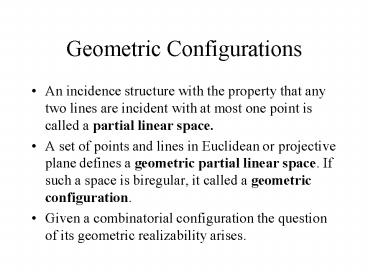Geometric Configurations - PowerPoint PPT Presentation
1 / 19
Title:
Geometric Configurations
Description:
Astral and Stellar Geometric Configurations ... When s is minimal, s = d k/2 e the configuration is called astral. ... The smallest astral (v3) configuration ... – PowerPoint PPT presentation
Number of Views:42
Avg rating:3.0/5.0
Title: Geometric Configurations
1
Geometric Configurations
- An incidence structure with the property that any
two lines are incident with at most one point is
called a partial linear space. - A set of points and lines in Euclidean or
projective plane defines a geometric partial
linear space. If such a space is biregular, it
called a geometric configuration. - Given a combinatorial configuration the question
of its geometric realizability arises.
2
Astral and Stellar Geometric Configurations
- Combinatorial cyclic configuration contains all
points (and all lines) in a single orbit. For k gt
2 we cannot draw such a geometric configuration
in the Euclidean plane in such a way as to
display the same (Euclidean) symmetry, i.e.
isometry. Clearly, each (v2) confiugration can
be drawn with a single orbit. . - If there exists a geometric realization with s
orbits (of equal size), a configuration is called
s-stellar. - For a stellar (vk) configuration we have k 2s.
- When s is minimal, s d k/2 e the configuration
is called astral. For the most interesting cases
k 3 and k 4 this means two orbits s 2.
3
The Smallest Astral (v3) Configuration
- The smallest astral (103) configuration.
4
The Smallest Astral (v3) Configuration with
Dihedral Symmetry
- The smallest astral (v3) configuration with
dihedral symmetry has v 12.
5
The Smallest Astral Triangle-Free (v3)
Configuration
- The smallest astral triangle-free (v3)
configuration has v 18.
6
A 4-stellar configuration
- A stellar (603) configuration that is
combinatorially equivalent to an astral
configuration.
7
A 4-stellar configuration
8
15. Existence and Enumeration of Combinatorial
Configurations
9
Lineal Configurations
- In order to emphasise configurations as parital
linear spaces we call them lineal configurations
( digon free configurations).
10
Existence of Lineal Configurations
- Proposition For each lineal (vr,bk)
configuration (r k) the following is true - v.r b.k
- b v 1 r(k 1)
- Corollary For symmetric (vk) configurations the
following lower bound is obtained - v 1 k(k-1) 1 k k2
- In particular
- For k 3 we have v 7,
- For k 4 we have v 13,
- For k 5 we have v 21.
11
Lower Bounds (Adapted from Grünbaum)
r\k 3 4 5 6 7
3 (73) (123,94) (203,125) (263,136) (353,157)
4 (94,123) (134) (204,165) ?(304,206)? ?(494,,287)?
5 (125,203) (165,204) (215) (305,256) ?(425,307)?
6 (136,263) ?(206,304)? (256,305) (316) X(496,427)X
7 (157,353) ?(287,494)? ?(307,425)? X(427,496)X X(437)X
12
Duality
- Each incidence structure C (P,L,I) gives rise
to a dual structure Cd (L,P,Id) with the role
of points and lines reversed and keeping the
incidence. - The structures C and Cd share the same Levi graph
with the roles of black and white vertices
reversed.
13
Self-Duality and Automorphisms
- If C is isomorphic to its dual Cd , it is said
that C is selfdual, the corresponding
isomorphism is called a (combinatorial) duality. - Duality of order 2 is called (combinatorial)
polarity. - An isomorphism mapping C to itself is called an
automorphism or (combinatorial) collinearity.
14
Automorphisms and Antiautomorphisms
- Automorphisms of the incidence structure C form a
grup that is called the group of automorphisms
and is denoted by Aut0C. - If automorphisms and dualities (antiautomorphisms)
are considered together as permutations, acting
on disjoint union P ? L, the extended group of
automorphism Aut C is obtained. - Warning If C is disconnected there may be
mixed automorphisms.
15
Graphs and Configurations
- The Levi graph of a configuration is bipartite
and carries complete information about
configuration. - Assume that C is connected. The extended group of
automorphisms AutC coincides with the group of
automorphisms of Levi graph L, while Aut0C
stabilises both partite sets.
16
Blocking Set
- A set of points B of an incidence structure is
called a blocking set, if each line L contains
two points x and y, such that - x 2 B and (x,L) 2 I,
- y Ï B and (y,L) 2 I.
17
Notation
18
Counting (v3) Configurations
19
Counting Triangle-Free (v3) Configurations































